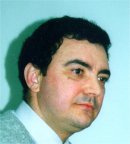Plenary
Lecture
The Contribution of Terology for a Sustainable Future

Professor Torres Farinha
President & Coordinator Professor
Engineering School of Coimbra Polytechnic Institute
Portugal
E-mail: tfarinha@mail.ipc.pt
Abstract: Terology is defined as the
combined utilization of operational research techniques, information
management and engineering, with the objective of accompanying the life cycle
of facilities and equipment; it includes the definition of specifications of
purchase, installation and reception, and also the management and control of
its maintenance, modification and replacement and, too, its accompanying in
service.
The author introduced this concept in 1994, with the objective to synthesize a
large view of the maintenance activity, that is necessary to implement in the
Organizations, in order to have good levels of reliability and a large life
cycle of facilities and equipment.
When this concept is implemented in a large organization it is necessary, to
re-equation the maintenance department, to increment its level of operation,
and to introduce an information system for maintenance management.
After this stage, the next step is to put into operation on-condition
maintenance techniques and a fault diagnosis system. Also, it is important to
reevaluate periodically the costs of functioning and the level of maintenance
of facilities and equipment, in order to guarantee the minimum costs and the
largest possible life cycle.
Usually, in modern Organizations, it is necessary to use the state-of-art of
technology but, also, it is necessary to minimize the impact over the nature
with the manufacturing of new goods, namely through methods and also through
the reduction of its production.
Then, the humanity needs to rethink the economy and to redesign this, in order
to maintain and, if possible, to increment his quality of life, with, always,
the biggest possible respect by the nature.
It is because of this that, with good terology management, good replacement
politicizes, good on-condition maintenance politicizes, namely the ones
connected to the environment, that terology or, by other words, this vision of
maintenance, is so important for a better and sustainable future.
A real maintenance management system, called SMIT, the core of a group of
other developments, some yet implemented and others under implementation and,
also, new future perspectives, that will be described within the paper
proposed. These developments are a real contribution for the perspective that
is being described.
The planet, the nature, the future, it is not sustainable if the man continue
destructing it to manufacture new good that, when its life ends, are destroy,
usually recycling, reusing or doing not, but always with big consumption of
energy and, many times, adding new materials not organics.
To have sustainability it is necessary to preserve, to increment life cycle of
goods, to reutilize, to return to the nature what will be possible, to live
together, humanity-nature and technology, friendly. To reach this objective
terology really helps and, because of this, the way showed in this
communication is a way that author believes that helps to have a better and
more sustainable future.
Brief Biography of the Speaker:
Jose Manuel Torres Farinha (www.torresfarinha.com), is Licentiate in
Electrical Engineering by Coimbra University, and PhD in Mechanical
Engineering by Oporto University. He is Senior Member and Specialist in
Industrial Maintenance by “Ordem dos Engenheiros”, that is the Association
that represents the long-cycle theoretically scientific studies in-depth in
Portugal (CLAIU member). He is Coordinator Professor at Engineering School of
Coimbra Polytechnic Institute (www.ipc.pt). Since 1994 he is member of
Mechanical Engineering Center from University of Coimbra – CEMUC -
(http://www2.dem.uc.pt/cemuc/index.htm), that is classified as Excellent by
“Fundacao para a Ciencia e a Tecnologia” - (http://alfa.fct.mctes.pt/index.phtml.en).
His main research is in Terology, around information maintenance systems,
fault diagnosis, and on condition maintenance, with emphasis in an ecological
approach. He wrote a book, chapters of books and has more than thirty papers
published in national and international journals and conferences. He is
President of Coimbra Polytechnic Institute (IPC), since 2001. In charge of
these functions he reached several innovative objectives, namely, by the first
time in Portugal, to certify a higher education institution, IPC – Coimbra
Polytechnic Institute - (Central Services, Social Services and Colleges) by
ISO 9001; IPC has 14.000 students, 6 schools, 1.000 teachers.